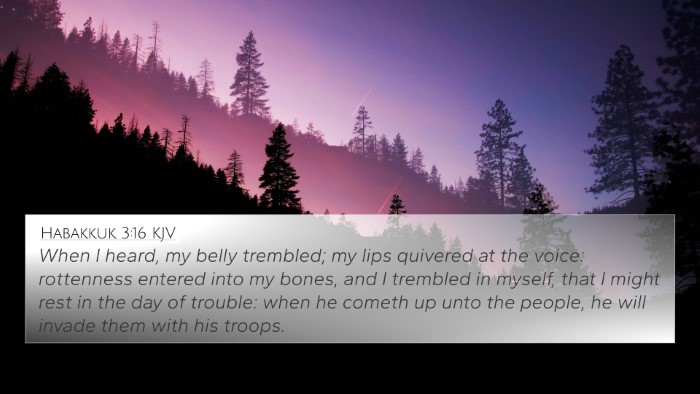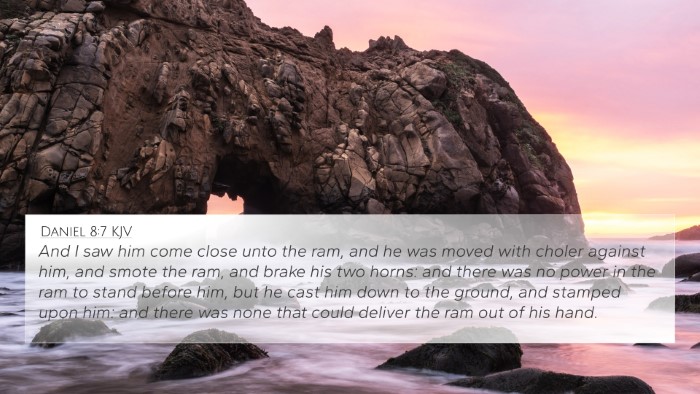Understanding Daniel 8:27 - A Comprehensive Analysis
Verse: "And I Daniel fainted and was sick certain days; afterward I rose up, and did the king's business; and I was astonished at the vision, but none understood it." (Daniel 8:27)
Overview
Daniel 8:27 presents a profound moment in the life of the prophet Daniel, where he reacts deeply to a troubling vision he received. This particular verse emphasizes not only Daniel’s physical and emotional distress but also highlights significant themes in the narrative of prophetic revelation.
Commentary Insights
-
Matthew Henry
Matthew Henry notes that Daniel’s reaction shows the weight of the visions he received. He emphasizes the seriousness of prophetic messages and the role they play in the life of the prophet. Henry suggests that Daniel’s fainting indicates the overwhelming nature of divine revelations, suggesting that understanding these messages is not only intellectually demanding but also spiritually taxing.
-
Albert Barnes
Albert Barnes posits that Daniel’s astonishment reflects a deeper understanding of the implications of the prophecy. Barnes discusses the futility of human comprehension without divine assistance, stressing the necessity of God’s revelation in interpreting visions. He also notes that despite Daniel's efforts, no one was able to comprehend the meaning, implying a divine mystery that remains beyond human understanding without the Spirit's enlightenment.
-
Adam Clarke
Adam Clarke elaborates on the impacts of the vision on Daniel's health. He remarks that the burden of carrying such revelations can bring about physical and emotional turmoil. Clarke points to the importance of rising up and conducting one’s responsibilities in the aftermath of profound spiritual experiences, illustrating a balance between spiritual awareness and worldly obligations.
Thematic Connections
This verse connects with several critical themes in the Bible, inviting readers to consider the broader implications of prophetic experiences:
- Prophetic Distress: Similar instances in Jeremiah 20:9 and Ezekiel 3:14 reflect the physical and emotional strains prophets endure.
- Divine Revelation: 1 Corinthians 2:14 highlights the necessity of spiritual discernment in understanding divine knowledge.
- Role of the Prophet: The interaction between political duty and spiritual calling can also be observed in Isaiah 6:8.
- Understanding Revelations: Revelation 1:3 speaks to the blessing of understanding the words of prophecy.
- Courage Amidst Fear: As seen in Joshua 1:9, the call to strength in times of fear resonates with Daniel’s experience.
- Visionary Encounters: Connections with other prophetic experiences can be drawn from Ezekiel 1:28.
Cross-Referencing Biblical Texts
For deeper insight, we can utilize a variety of tools for Bible cross-referencing to explore interrelated texts.
- Bible Concordance: A reference tool leading to themes and subjects that connect.
- Cross-Reference Bible Study: Methods for examining parallels between different scriptures.
- Comprehensive Bible Cross-Reference Materials: Resources that enable comparative studies.
Conclusion
Daniel 8:27 serves as a powerful reminder of both the burdens and responsibilities of prophetic ministry. Cross-referencing verses related to this chapter enhances our understanding of the emotional and spiritual landscape facing those called to deliver divine messages. Utilizing tools and techniques for Bible cross-referencing, readers can unlock richer interpretations and connections between the prophetic texts and the overall Biblical narrative.
Related Bible Verses
- Jeremiah 20:9 - The struggle of a prophet's heart.
- Ezekiel 3:14 - The burden of prophetic words.
- 1 Corinthians 2:14 - Discernment of spiritual matters.
- Isaiah 6:8 - The call to service and obedience.
- Revelation 1:3 - Understanding and blessing in prophecy.
- Joshua 1:9 - The theme of courage in divine commands.
- Ezekiel 1:28 - The awe and majesty of visionary encounters.












